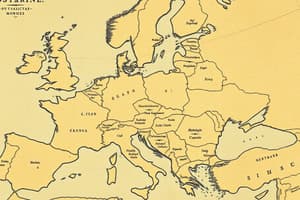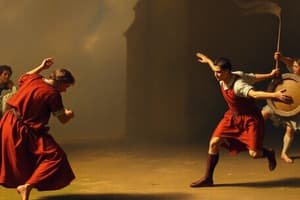Podcast
Questions and Answers
What was one major reason for the training of combat sports in the Middle Ages?
What was one major reason for the training of combat sports in the Middle Ages?
- To develop tactical formations for large battles
- To promote artistic expression through athletics
- To create entertainment for the masses
- To maintain physical strength and endurance (correct)
Which factor significantly influenced the variation of sports across different regions during the Middle Ages?
Which factor significantly influenced the variation of sports across different regions during the Middle Ages?
- Local traditions and customs (correct)
- The availability of natural resources
- The presence of international trade
- The popularity of specific religions
How did the evolution of rules and regulations in sports during the Middle Ages occur?
How did the evolution of rules and regulations in sports during the Middle Ages occur?
- It emerged from individual athlete competitions
- It was structured through social developments during tournaments (correct)
- It was primarily influenced by political treaties
- It developed alongside military strategies
What type of sources are crucial for assembling interpretations of sports history in the Middle Ages?
What type of sources are crucial for assembling interpretations of sports history in the Middle Ages?
In what ways did participation in sports contribute to daily life in the Middle Ages?
In what ways did participation in sports contribute to daily life in the Middle Ages?
What role did sport play in social and religious life during the Middle Ages?
What role did sport play in social and religious life during the Middle Ages?
Which type of sport was associated with military training in the Middle Ages?
Which type of sport was associated with military training in the Middle Ages?
How did hunting demonstrate social status in the Middle Ages?
How did hunting demonstrate social status in the Middle Ages?
What were games of chance primarily associated with during the Middle Ages?
What were games of chance primarily associated with during the Middle Ages?
Which sport was noted for its connection to warfare strategy during the Middle Ages?
Which sport was noted for its connection to warfare strategy during the Middle Ages?
Which statement correctly describes the relationship between sport and festivals in the Middle Ages?
Which statement correctly describes the relationship between sport and festivals in the Middle Ages?
What influence did social class have on the types of sports played in the Middle Ages?
What influence did social class have on the types of sports played in the Middle Ages?
What was the significance of tournaments and festivals for combat sports during the Middle Ages?
What was the significance of tournaments and festivals for combat sports during the Middle Ages?
Flashcards
Physical Fitness in the Middle Ages
Physical Fitness in the Middle Ages
The ability to perform physical tasks, like running, jumping, and lifting, with strength and energy.
Recreation and Leisure in the Middle Ages
Recreation and Leisure in the Middle Ages
Sports were a way to relax, have fun, and meet people in the Middle Ages.
Regional Variation in Medieval Sports
Regional Variation in Medieval Sports
Different regions had unique sports based on their traditions and environments.
Evolution of Rules and Regulations in Medieval Sports
Evolution of Rules and Regulations in Medieval Sports
Signup and view all the flashcards
Preserving Historical Information on Medieval Sports
Preserving Historical Information on Medieval Sports
Signup and view all the flashcards
How was sport integrated into medieval life?
How was sport integrated into medieval life?
Signup and view all the flashcards
What were some popular combat sports in the Middle Ages?
What were some popular combat sports in the Middle Ages?
Signup and view all the flashcards
What were some popular ball games in the Middle Ages?
What were some popular ball games in the Middle Ages?
Signup and view all the flashcards
What role did hunting play in medieval society?
What role did hunting play in medieval society?
Signup and view all the flashcards
How did horse riding influence medieval sport?
How did horse riding influence medieval sport?
Signup and view all the flashcards
What was the role of sport in medieval festivals?
What was the role of sport in medieval festivals?
Signup and view all the flashcards
How did sports reflect social status in the Middle Ages?
How did sports reflect social status in the Middle Ages?
Signup and view all the flashcards
How did religion influence medieval sports?
How did religion influence medieval sports?
Signup and view all the flashcards
Study Notes
Overview of Sport in the Middle Ages
- Sport in the Middle Ages was diverse and deeply intertwined with social and religious life.
- It was not a separate entity from daily life but rather interwoven with social activities and religious customs.
Types of Sport
- Combat sports:
- Chess, a popular intellectual game, was not just recreational but also linked to warfare strategy.
- Wrestling, jousting, and sword fighting were popular forms of entertainment and training for combat.
- These combat sports were frequently associated with tournaments and festivals.
- Ball games:
- Various ball games existed, often played by different social classes and for diverse purposes.
- These games often developed from activities involving social groups, exemplified by youth games.
- Hunting and equestrian sports:
- Hunting was a significant pastime demonstrating wealth and skill.
- Hunting animals and training hunting dogs highlighted social status.
- Horse riding, for both practical and recreational uses, was widespread, leading to equestrian sports like jousting.
- Games of chance:
- Games involving chance and luck, like dice games, were common social entertainment connected with celebrations, feasting, and drinking.
- The combination of games of chance with feasting was a significant cultural aspect.
Social and Religious Context
- Entertainment and festivals:
- Sport was a common form of entertainment during festivals, particularly religious ones, celebrating both religious and secular occasions.
- Sport was a social gathering and an integral part of religious celebrations.
- Social status:
- Participation in and showcasing skill in various sports were strongly linked to social standing.
- Chosen sports and displayed skill significantly influenced social class.
- Religious influences:
- Religious beliefs and values shaped the types of sports played and the social context.
- Some sports were linked to religious rituals or beliefs.
- Military training:
- Many sports, especially combat-oriented ones, played a vital role in military training.
- The emphasis on efficient warriors, used combat sports through tournaments and displays of skill and strength, and formed military activities.
Physicality and Health
- Physical fitness:
- Participation in sports was seen as a way to improve and maintain physical strength and endurance, crucial for daily life beyond fighting and hunting.
- Importance of physical fitness reflected societal and cultural views of an ideal body and its function.
- Recreation and leisure:
- Sports provided opportunities for relaxation, socialization, and engaging in recreational activities; a popular form of leisure.
Further Considerations
- Regional variations:
- Sports varied considerably across different regions, reflecting local traditions and customs.
- Evolution of rules and regulations:
- Sports of various types became increasingly structured and organized alongside evolving social structures, particularly during tournaments.
- Preservation of historical information:
- Historical records of medieval sports are often incomplete and fragmented, making a full understanding challenging.
- Written accounts, visual representations, and archaeological findings provide crucial sources for piecing together interpretations.
Studying That Suits You
Use AI to generate personalized quizzes and flashcards to suit your learning preferences.





